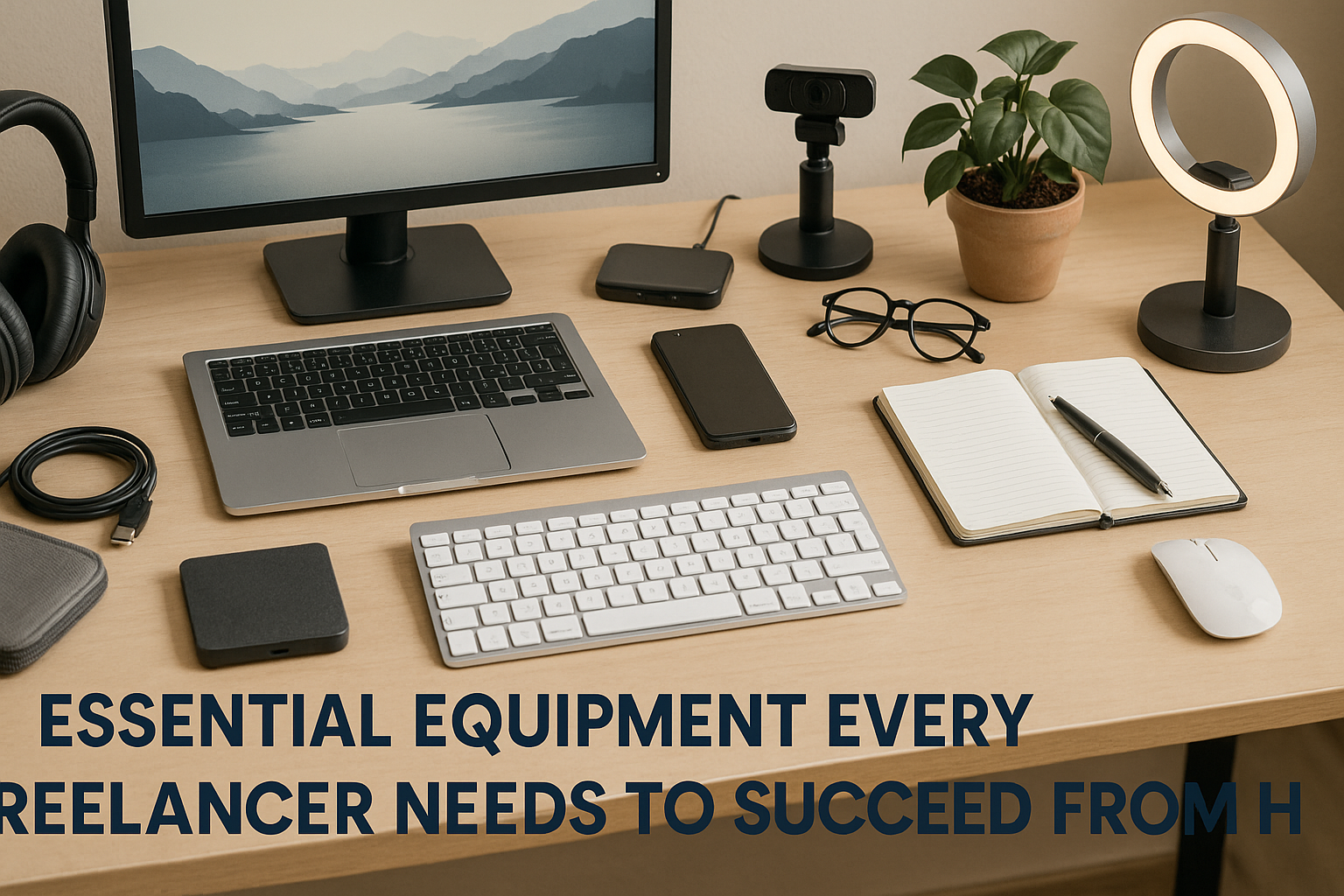Working as a freelancer gives you freedom—but also the responsibility of creating a productive, comfortable workspace. Whether you’re a writer, designer, developer, or marketer, having the right tools and equipment can make a huge difference in your performance and well-being. In this article, we’ll walk you through the must-have gear that helps freelancers stay organized, efficient, and professional from home.
Why Equipment Matters for Freelancers
Unlike traditional jobs where everything is provided, freelancers must invest in their own tools. Good equipment:
- Increases productivity and comfort
- Reduces technical issues and distractions
- Enhances the quality of your work
- Makes you appear more professional to clients
Let’s break down the essentials by category.
1. A Reliable Computer
Your laptop or desktop is the core of your freelance business. It needs to handle your workload smoothly without crashing or slowing down.
What to look for:
- Writers & VAs: Lightweight laptops (e.g., MacBook Air, Lenovo ThinkPad)
- Designers & Video Editors: High RAM (16GB+), strong GPU, fast SSD
- Developers: Good processor (Intel i7 or M1/M2), dual-screen support
Invest in the best machine you can afford—it’s worth it.
2. High-Speed Internet Connection
Slow or unreliable internet can ruin productivity and frustrate clients during calls.
Tips:
- Aim for at least 100 Mbps download speed
- Use wired Ethernet for stability during uploads or meetings
- Consider a backup hotspot from your phone in case of outages
Test your speed regularly using tools like Speedtest.net.
3. Ergonomic Chair and Desk
Freelancers spend hours at their desk, and poor posture leads to back pain, fatigue, and long-term health issues.
Essentials:
- Adjustable ergonomic chair with lumbar support
- Desk at the correct height (consider a standing desk or converter)
- Footrest for proper posture
Comfort = productivity.
4. External Monitor (or Dual Screens)
More screen space means better multitasking, especially for designers, developers, writers, and marketers.
Benefits:
- Easier editing, design, or coding
- Reduces eye strain and switching tabs
- Improves posture by lifting the screen to eye level
Even a budget 24” monitor can make a huge impact.
5. Noise-Canceling Headphones or Earbuds
If you’re working from home with background noise, noise-canceling headphones are a game-changer—especially during video calls or deep focus sessions.
Popular options:
- Bose QuietComfort
- Sony WH-1000XM series
- Apple AirPods Pro (for portability)
Great audio is also important for editors and podcasters.
6. External Webcam and Microphone
Your laptop’s built-in camera and mic may not cut it for professional client meetings or recordings.
Upgrade to:
- HD webcam (Logitech C920, Elgato Facecam)
- USB microphone (Blue Yeti, Rode NT-USB)
Clear video and sound boost your credibility during presentations, interviews, and virtual pitches.
7. Lighting for Video Calls
A well-lit face makes you look more engaged and professional on Zoom or Teams.
Options:
- Ring light or desk lamp with adjustable color temperature
- Position the light in front of your face, not behind you
- Avoid harsh overhead lighting that casts shadows
Lighting matters, especially if you’re on camera frequently.
8. Backup Storage and Cloud Sync
Don’t risk losing your work. Use both physical backups and cloud storage for safety and easy access.
Use:
- External SSD or hard drive (for local backups)
- Google Drive, Dropbox, or OneDrive (for automatic syncing)
- A cloud-based note-taking system like Notion or Evernote
Always back up important client files and contracts.
9. Productivity Tools and Apps
The right software can save you time and streamline your workflow.
Recommendations:
- Project management: Trello, ClickUp, Asana
- Time tracking: Toggl, Clockify
- Communication: Slack, Zoom
- Invoicing: Wave, Bonsai, PayPal
- Writing: Grammarly, Hemingway App
Choose tools that match your workflow and reduce manual work.
10. Stationery and Workspace Extras
Even in a digital world, a few analog tools can boost productivity and organization.
Nice-to-have items:
- Planner or bullet journal
- Whiteboard or corkboard
- Sticky notes for quick reminders
- Cable organizers
- Desk plants for a calming environment
Aesthetic, organized spaces reduce stress and spark creativity.
Optional but Powerful Upgrades
Once your budget allows, consider:
- Standing desk for energy and posture
- Laptop stand + Bluetooth keyboard for ergonomics
- Second monitor for editing or multitasking
- Professional backdrop if you record videos or teach online
These upgrades increase both performance and long-term comfort.
Final Thoughts: Invest in Your Success
Freelancing isn’t just a job—it’s a business. And every successful business needs the right tools. While you don’t have to buy everything at once, investing in quality equipment gradually will make your freelance journey smoother, more professional, and more profitable.
Start with the basics. Upgrade as you grow. And remember: the better your setup, the better your results.

